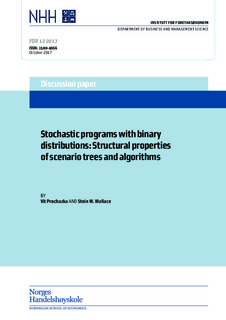Stochastic programs with binary distributions: Structural properties of scenario trees and algorithms
Working paper

Åpne
Permanent lenke
http://hdl.handle.net/11250/2462787Utgivelsesdato
2017-10-27Metadata
Vis full innførselSamlinger
- Discussion papers (FOR) [566]
Sammendrag
Binary random variables often refer to such as customers that are present or not, roads that are open or not, machines that are operable or not. At the same time, stochastic programs often apply to situations where penalties are accumulated when demand is not met, travel times are too long, or profits too low. Typical for these situations is that the penalties imply a partition of the scenarios into two sets: Those that can result in penalties for some decisions, and those that never lead to penalties. We demonstrate how this observation can be used to efficiently calculate out-of-sample values, find good scenario trees and generally simplify calculations. Most of our observations apply to general integer random variables, and not just the 0/1 case.